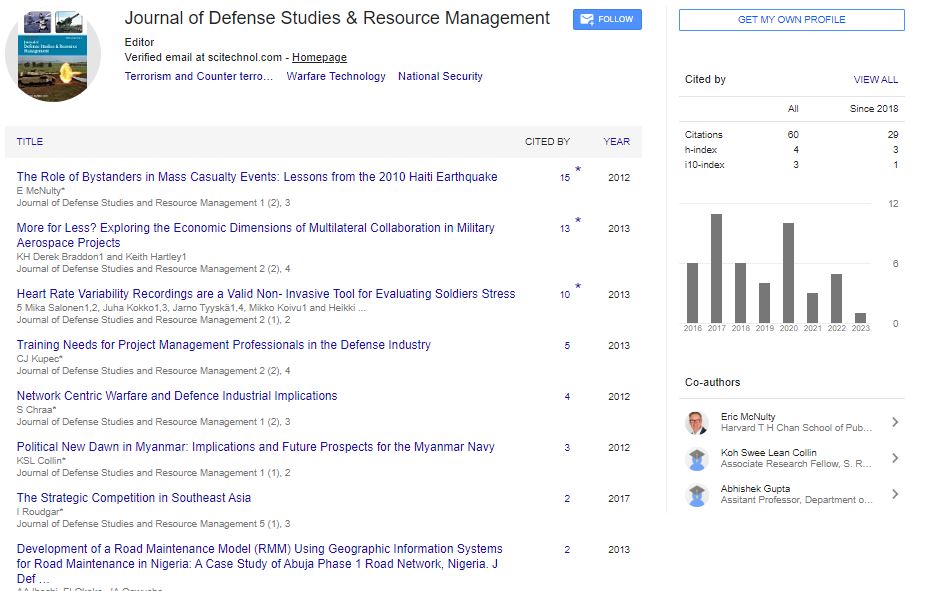Perspective, J Def Stud Resour Manage Vol: 11 Issue: 2
Securing the Promised Land: Exploring Israel's Security Studies and Strategies
Khalid Zubair*
1Department of Political Science, Hebrew University of Jerusalem, Mount Scopus, Jerusalem, Israel
*Corresponding Author: Khalid Zubair,
Department of Political Science,
Hebrew University of Jerusalem, Mount Scopus, Jerusalem, Israel
E-mail: zubair66@hotmail.com
Received date: 29 May, 2023, Manuscript No. JDSRM-23-107155;
Editor assigned date: 31 May, 2023, PreQC No. JDSRM-23-107155(PQ);
Reviewed date: 14 June, 2023, QC No. JDSRM-23-107155;
Revised date: 22 June, 2023, Manuscript No. JDSRM-23-107155(R);
Published date: 29 June, 2023, DOI: 10.4172/2324-9315.1000178
Citation: Zubair K (2023) Securing the Promised Land: Exploring Israel's Security Studies and Strategies. J Def Stud Resour Manage 11:2.
Abstract
Description
Israel's security studies are shaped by a unique combination of historical context, ongoing regional conflicts, and persistent security threats. As a nation situated in a volatile region, Israel faces multifaceted challenges that require a comprehensive approach to security. This article explores the security studies of Israel, delving into its historical background, geopolitical dynamics, military capabilities, intelligence apparatus, and the evolving security landscape. By examining Israel's security studies, we gain insights into the nation's approach to safeguarding its national security and addressing the complex security challenges it faces.
Historical context
Israel's security studies are deeply rooted in its historical context. Founded in 1948, Israel's establishment was followed by wars and conflicts with neighboring countries, resulting in a persistent state of regional tension. The memory of the Holocaust and the enduring desire for a secure homeland greatly influence Israel's security policies, emphasizing the need for self-reliance and deterrence.
Geopolitical dynamics
Israel's geopolitical location in the Middle East has significant implications for its security studies. Surrounded by nations with varying degrees of hostility, Israel faces threats such as terrorism, missile proliferation, and regional instability. The Israeli-Palestinian conflict, ongoing tensions with Iran, and the challenges posed by nonstate actors shape the country's security considerations.
Military capabilities
Israel has developed a robust military apparatus to address its security challenges. Its defense forces, including the Israel Defense Forces (IDF), are known for their professionalism and technological advancements. Israel's military capabilities encompass air superiority, ballistic missile defense, Special Forces, and intelligence gathering capabilities. The country's defense industry plays a crucial role in developing cutting-edge technology and weaponry. The IDF consists of the Ground Forces, Air Force, and Navy, each equipped with state-of the-art weaponry and specialized units. Israel's Air Force (IAF) stands out as a crucial component of its military might. It possesses a fleet of advanced fighter jets, including F-15s and F-16s, as well as Unmanned Aerial Vehicles (UAVs) such as the Heron and the Hermes.
The IAF has demonstrated its proficiency through preemptive strikes on hostile targets, defensive air operations, and intelligence-gathering missions. The Ground Forces of the IDF are renowned for their mobility, flexibility, and firepower. They are equipped with advanced armoured vehicles, artillery systems, and infantry weapons. Special Forces units, such as the elite sayeret matkal and shayetet 13, excel in covert operations, intelligence gathering, and counterterrorism. The Navy plays a critical role in protecting Israel's coastlines and maritime interests. It maintains a modern fleet of missile boats, submarines, and patrol vessels.
The Navy conducts maritime security operations, monitors sea routes, and safeguards Israel's offshore natural resources. Israel's defense industry is a significant contributor to its military capabilities. It fosters innovation, research, and development, resulting in the production of advanced technologies, including precision-guided munitions, missile defense systems, cyber defense capabilities, and cutting-edge intelligence equipment. The defense industry not only caters to Israel's domestic needs but also exports military hardware and technology worldwide, contributing to its reputation as a global leader in defense innovation.
Israel's military capabilities are honed through continuous training and joint exercises with international partners, particularly the United States. Bilateral military cooperation, including joint military exercises, intelligence sharing, and defense collaboration, strengthens Israel's defense posture and enhances its interoperability with allied forces. By maintaining a technologically advanced and well-trained military, Israel is prepared to address the security challenges it faces. Its military capabilities provide deterrence, rapid response capabilities, and the ability to defend against threats in a highly dynamic and volatile security environment.
Intelligence apparatus
Israel's intelligence community is integral to its security studies. Agencies such as Mossad and Shin Bet provide vital intelligence, counterterrorism efforts, and covert operations to protect national security interests. Israel's intelligence community has gained international recognition for its effectiveness in gathering intelligence and countering security threats.
Security landscape
Israel's security landscape is marked by a range of challenges. The Israeli-Palestinian conflict remains a significant security concern, with ongoing tensions, border disputes, and the threat of terrorism. Israel also faces threats from regional actors, including Iran's nuclear ambitions and support for proxy groups. The rise of non-state actors such as Hezbollah and Hamas adds complexity to the security environment. Additionally, cyber threats pose a growing challenge, requiring robust defenses to protect critical infrastructure and information networks.
Mitigation strategies
Israel employs a multi-layered approach to mitigate security threats. This includes proactive measures such as preemptive strikes on potential threats, targeted operations against terrorist organizations, and diplomatic efforts to build regional alliances. Israel invests in research and development to maintain technological superiority and continuously adapt to emerging security challenges. International partnerships, particularly with the United States, provide crucial support and collaboration in defense and intelligence.
Conclusion
Israel's security studies are shaped by its historical context, geopolitical dynamics, and persistent security threats. The nation's commitment to safeguarding its national security is evident in its military capabilities, intelligence apparatus, and proactive security measures. Israel's security landscape remains complex, necessitating constant adaptation and vigilance. By examining Israel's security studies, we gain a deeper understanding of the challenges faced by the nation and the strategies employed to navigate a volatile region.
 Spanish
Spanish  Chinese
Chinese  Russian
Russian  German
German  French
French  Japanese
Japanese  Portuguese
Portuguese  Hindi
Hindi 